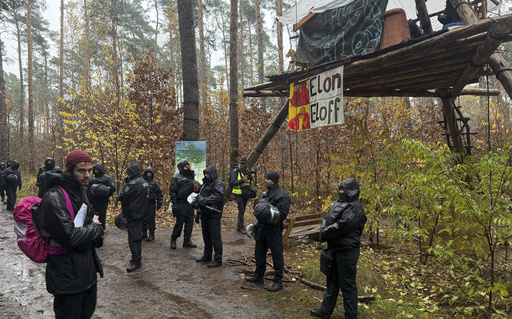
BERLIN — Authorities in Germany took action on Tuesday to dismantle a protest camp occupied by environmental activists situated in a forest close to the Tesla electric vehicle manufacturing facility in Grünheide, located just outside of Berlin. This decision was made due to concerns regarding public safety and adherence to local laws.
The protesters had established their presence in the pine forest near Elon Musk’s first Tesla factory in Europe starting from late February, raising alarms over issues related to water usage and deforestation in the region. Tesla aims to broaden its operations at the Grünheide site by adding a freight station and storage facilities, which involves acquiring additional wooded land from the state of Brandenburg, where the factory operates.
Initially, police were dispatched to the protest camp on Monday to conduct a temporary evacuation of specific areas that included tree houses. This move was in response to plans for a search for potentially dangerous explosive ordnance dating back to World War II. However, the activists opted to stay put, choosing instead to scale the trees. Reports indicate that police ultimately removed six individuals from the tree houses after they declined to vacate voluntarily.
The total disbandment of the protest camp on Tuesday came about as the activists were found to be consistently breaching regulations and engaging in illegal activities. Local police representative Daniel Keip informed that attempts to communicate with the protest leaders proved unsuccessful and it became increasingly clear that the protest was unlikely to remain peaceful.
This area near the Tesla factory has been subject to ongoing scrutiny concerning the potential presence of unexploded ordnance from World War II. Germany continues to encounter dormant bombs and other military relics nearly eight decades following the conflict’s conclusion, a phenomenon that frequently surfaces during construction projects. Typically, such explosives are dealt with through controlled detonation or careful disposal, often necessitating significant evacuations as a safety measure.
